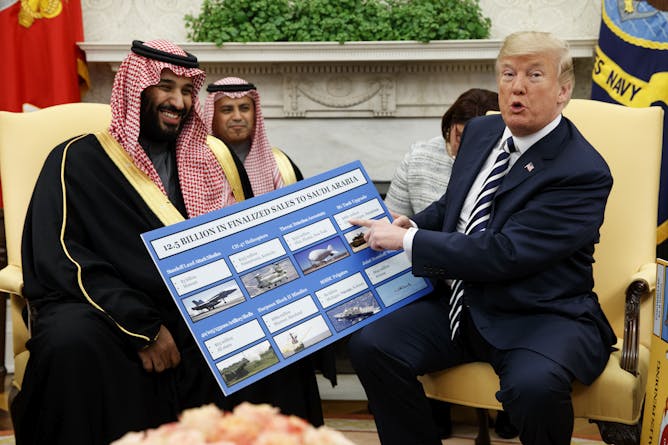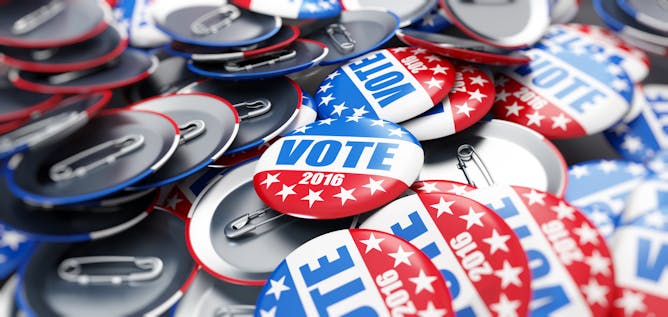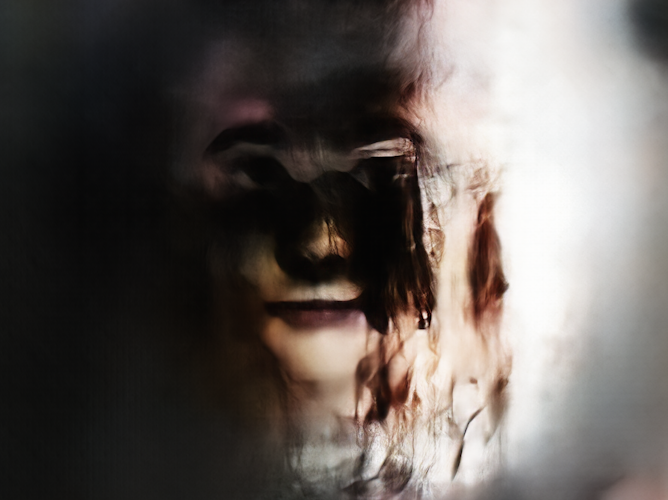Editor's note
|
|
The disappearance of Saudi journalist Jamal Khashoggi two weeks ago has caused an international crisis. President Donald Trump has shown strong reluctance to the idea of sanctioning the Saudi government, which is suspected of murdering Khashoggi. International relations professor Russell Lucas of Michigan State University writes that Trump’s response to what many in the international community see as a human rights crisis has focused primarily on the negative effect such sanctions would have on American jobs -- giving the world a strong dose of what “America First” really means.
After the 2016 election, many pundits wondered why polls hadn’t better predicted Trump’s victory. Statistician Fred Wright and his son dug into the numbers to figure out why. Their new research suggests that pollsters need to revamp the way they aggregate data from different national and state polls across the country.
Later this month, Christie’s will be selling its first piece of AI art, and computer scientist Ahmed Elgammal, who runs the AI & Art Lab at Rutgers University, will be eagerly awaiting the results. While many critics have derided this new art form, which uses algorithms and machine learning to create new images out of preexisting ones, Elgammal views AI art as an exciting frontier of conceptual art.
|
Danielle Douez
Associate Editor, Politics + Society
|

|
|
Top stories
|

President Donald Trump shows a chart highlighting arms sales to Saudi Arabia.
AP Photo/Evan Vucci
Russell E. Lucas, Michigan State University
A missing Saudi journalist has put Trump's 'America First' rhetoric to the test.
|

Many pollsters have been asked to explain why they didn’t better predict the 2016 election.
3dfoto/shutterstock.com
Fred Wright, North Carolina State University
When political polls are aggregated together, that can make the results misleading.
|

Mario Klingemann’s ‘Neural Glitch Portrait 153552770’ was created using a generative adversarial network.
Mario Klingemann
Ahmed Elgammal, Rutgers University
Later this month, Christie's will be auctioning its first piece of AI art – a portrait created via machine learning.
|
|
|
|
|
|
|
Science + Technology
|
-
Arend Hintze, Michigan State University
Artificial intelligence research owes a lot to biology and chemistry.
-
Nicholas Fitzkee, Mississippi State University
Smooth surfaces often provide nooks and crannies for bacteria to hold onto and create a colony. New research with nanoparticles is revealing the secrets of surfaces that prevent bacterial attachment.
|
|
From our international editions
|
-
Jacqueline L. Scott, University of Toronto
When you are the first lady of the United States, your fashion choices are scrutinized. Why did Melania Trump choose to wear a pith helmet, a classic symbol of colonialism?
-
Gareth Dorrian, Nottingham Trent University; Ian Whittaker, Nottingham Trent University
The upper atmosphere of Venus is the most Earth-like extra-terrestrial location in the solar system. It could even host life.
-
Alexandra Hansen, The Conversation
Five out of five experts said we shouldn't reward kids with food. But for very different reasons.
|
|
|
|
| |
| |
|
|